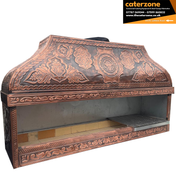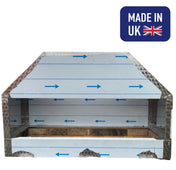- New arrival
Caterzone
4 x Heavy Duty 100mm Swivel Castor Wheels w/ Brake Trolley Furniture Caster
Low stock (10 units)Regular price £60.00Unit price /Unavailable - £122.05 offNew arrival
UK CATERING
Commercial Dishwasher Basket Trolley Stainless Steel 9 Levels 550x510x1700mm | Rt5509
In stock (29 units)Sale price £159.95 Regular price £282.00Unit price /Unavailable - New arrival
Hamoki UK
301003 - Service Trolley 2 Tier With Round Tube
In stock (67 units)Regular price £120.00Unit price /Unavailable - New arrival
Hamoki UK
301004 - Service Trolley 3 Tier With Round Tube
Very low stock (2 units)Regular price £145.00Unit price /Unavailable - New arrival
Hamoki UK
301006 - Multifunctional Racking Trolley 18 Shelves for Both GN Pan 1/1 , 40x60 cm Trays
Very low stock (3 units)Regular price £300.00Unit price /Unavailable - New arrival
Hamoki UK
301007 - Racking Trolley 16 Shelves for GN Pan 1/1
Low stock (12 units)Regular price £275.00Unit price /Unavailable - Sold outNew arrival
Hamoki UK
301008 - Racking Trolley 15 Tier Double Row for GN1/1 (30 Shelves)
Regular price £345.00Unit price /Unavailable - New arrival
Hamoki UK
301009 - Racking Trolley 15 Shelves for Bakery Trays
In stock (34 units)Regular price £263.00Unit price /Unavailable - New arrival
Hamoki UK
301010 - Racking Trolley 6 Shelves with Work Table Top for GN Pan 1/1
In stock (69 units)Regular price £213.00Unit price /Unavailable - New arrival
Hamoki Limited
301085 - Commercial Waste Bag Holder Trolley (buy 1, get 1 FREE!)
In stock (40 units)Regular price £155.00Unit price /Unavailable - Sold out£123.35 off
UK CATERING
Commercial Popcorn Maker With Retro Trolley 1.44k W 940x450x1540mm | Popcorn104
Sale price £269.95 Regular price £393.30Unit price /Unavailable - Sold out£736.25 off
UK CATERING
Commercial Electric Conveyor 18” Pizza Oven With Trolley 1560x750x340mm | Lm18 C
Sale price £1,596.95 Regular price £2,333.20Unit price /Unavailable - Sold out£485.15 off
UK CATERING
Commercial Electric Conveyor 12” Pizza Oven With Trolley 1150x600x370mm | Lm12 C
Sale price £1,051.95 Regular price £1,537.10Unit price /Unavailable - £1,741.75 offNew arrival
UK CATERING
Commercial Electric 18” Conveyor Pizza Oven With Trolley 1580x1050x450mm | Lm18 D
Very low stock (1 unit)Sale price £3,773.95 Regular price £5,515.70Unit price /Unavailable - £1,741.75 offNew arrival
UK CATERING
Commercial Electric 14” Conveyor Pizza Oven With Trolley 1280x910x480mm | Lm14 D
Very low stock (2 units)Sale price £3,773.95 Regular price £5,515.70Unit price /Unavailable UK CATERING
Professional 3 Tier Busing Trolley Cart With Lockable Doors 1020x500x960mm | Jgm710
Low stock (11 units)Sale price £280.95 Regular price £410.40Unit price /UnavailableUK CATERING
Rack/Tray/Pan Trolley Stainless Steel Gastronorm Gn1/1 6 Tier With Top Shelf | Rt1106 T
Sale price £167.95 Regular price £245.10Unit price /UnavailableSammic
Low stock (15 units)Regular price £1,044.00Unit price /UnavailableSammic
Trolley for HX-211T 20 x GN 1/1
Low stock (15 units)Regular price £3,190.00Unit price /UnavailableSammic
Trolley-stand SE/SU-400 (505 x 550 x 630 mm)
Low stock (15 units)Regular price £784.00Unit price /UnavailableSammic
Trolley for bakery trays 16 x 600 x 400 mm CG-1664
Low stock (15 units)Regular price £874.00Unit price /UnavailableSammic
Trolley for GN trays with worktop 7 x GN 1/1 CG-711
Low stock (15 units)Regular price £545.00Unit price /UnavailableSammic
Extra strong transport trolley (2 shelves) - 1000 x 600 mm - CSR-210
Low stock (15 units)Regular price £1,049.00Unit price /UnavailableSammic
Transport trolley (2 shelves) - 800 x 500 mm - CS-208
Low stock (15 units)Regular price £595.00Unit price /UnavailableSammic
Low stock (15 units)Regular price £363.00Unit price /UnavailableSammic
Trolley for dishwasher baskets with handle CCVA
Low stock (15 units)Regular price £576.00Unit price /UnavailableSammic
Trolley for dishwasher baskets CGC-7
Low stock (15 units)Regular price £831.00Unit price /Unavailable- Sold out£90.05 off
UK CATERING
Rack/Tray/Pan Trolley Stainless Steel Gastronorm 2 In 1 For Gn1/1 And 60x40 Pans 15 Tier | Rt2 N115
Sale price £194.95 Regular price £285.00Unit price /Unavailable UK CATERING
Low stock (16 units)Sale price £165.95 Regular price £241.30Unit price /UnavailableUK CATERING
Low stock (9 units)Sale price £165.95 Regular price £279.30Unit price /UnavailableUK CATERING
Professional Heavy Duty 2 Tier Platform Trolley With Handle 225kg Capacity 910x600mm | Ppt916021
Low stock (18 units)Sale price £149.95 Regular price £256.50Unit price /Unavailable- Sold out£199.15 off
UK CATERING
Commercial 2 Sided Roll Cage Trolley Zinc Plated Steel 360kg Capacity 680x900x1720mm | Bhk01
Sale price £102.95 Regular price £302.10Unit price /Unavailable - Sold out£226.95 off
UK CATERING
Sale price £154.95 Regular price £381.90Unit price /Unavailable UK CATERING
Sale price £115.95 Regular price £294.50Unit price /UnavailableUK CATERING
Commercial Stainless Steel Service Trolley 3 Tier 1000x600x940mm | Vs3 R106
Sale price £180.95 Regular price £332.50Unit price /UnavailableUK CATERING
Rack/Tray/Pan Trolley Stainless Steel For 30 X 600x400mm Sheet Pan 15 Tier | Rt6430
Sale price £187.95 Regular price £273.60Unit price /UnavailableUK CATERING
Trolley For 660x460mm Sheet Pan | Alrt1826
In stock (27 units)Sale price £115.95 Regular price £242.00Unit price /UnavailableUK CATERING
Commercial Dough Box Service Trolley Stainless Steel 1300x600x750mm | Whdt13060
Sale price £161.95 Regular price £244.00Unit price /Unavailable- £290.05 offNew arrival
UK CATERING
Commercial Plate Trolley 300 Plates 6 Stacks 930x720x800mm | Whjcdc240
Low stock (13 units)Sale price £573.95 Regular price £864.00Unit price /Unavailable - £106.05 offNew arrival
UK CATERING
Low stock (18 units)Sale price £239.95 Regular price £346.00Unit price /Unavailable - Sold out£170.05 off
UK CATERING
Professional Front And Rear Door Mobile Bakery Trolley With Cabinet 15 Tier Stainless Steel | Rtc201
Sale price £391.95 Regular price £562.00Unit price /Unavailable - £126.05 offNew arrival
UK CATERING
10 Tier Rack/Tray/Pan Trolley For Width 310 350mm Covered Sides Stainless Steel | Pt10 P
Low stock (15 units)Sale price £271.95 Regular price £398.00Unit price /Unavailable UK CATERING
Sale price £233.95 Regular price £508.00Unit price /Unavailable- £111.05 offNew arrival
UK CATERING
Commercial Dishwasher Basket Trolley Stainless Steel 2x9 Levels 1185x533x1700mm | Rt5509 D
Low stock (10 units)Sale price £256.95 Regular price £368.00Unit price /Unavailable - £116.05 offNew arrival
UK CATERING
Economic Design Rack Trolley Dual Row 2x15 Tiers For 600x400mm Sheet Pans | Ert6415 X2
Low stock (15 units)Sale price £227.95 Regular price £344.00Unit price /Unavailable - £115.05 offNew arrival
UK CATERING
Design Rack Trolley Dual Row 2x15 Tiers For 660x460mm Sheet Pans | Ert7515 X2
Very low stock (8 units)Sale price £254.95 Regular price £370.00Unit price /Unavailable
Trolleys Serve as Vital Equipment for Efficient Kitchen Operations
Trolleys make operations more efficient and organized while improving safety conditions in commercial kitchens. They serve as essential tools for transporting ingredients and clearing dirty dishes.
Understanding Trolleys in Commercial Kitchens
Kitchen trolleys are robust mobile carts designed to move items around with ease. They play a vital role in maintaining efficient kitchen workflows.
Purpose of Trolleys in Foodservice
Trolleys streamline kitchen workflows by reducing manual handling, minimizing injuries, and keeping workspaces organized for smoother service delivery.
Types of Trolleys Used in Foodservice
Utility Trolleys
Multipurpose carts with open shelves, ideal for transporting supplies and equipment around prep areas and kitchens.
Serving Trolleys
Designed to transport prepared dishes from kitchen to dining areas, often featuring covered sections to maintain food temperature and enhance presentation.
Clearing Trolleys
Used to clear dirty dishes from tables, equipped with multiple shelves and heavy-duty casters for fast and safe removal.
Beverage Trolleys
Designed to transport drinks and accessories, featuring bottle compartments and glass racks, ideal for restaurants and hotels.
Dish Trolleys
Used to organize and transport clean or dirty dishes in high-volume kitchens, improving dishwashing efficiency.
Selecting a Trolley: Key Features to Consider
Material Durability
Stainless steel offers excellent corrosion resistance and strength, while aluminum or durable plastic suits lighter tasks.
Load Capacity
Choosing the right load capacity prevents damage and ensures safe operation, tailored to the kitchen’s specific demands.
Maneuverability
Swivel casters and locking wheels allow for easy navigation and secure positioning, supported by ergonomically designed handles.
Ease of Cleaning
Smooth surfaces and non-porous materials like stainless steel ensure hygiene and simplify cleaning tasks.
Size and Dimensions
Choose the right trolley size to fit your kitchen layout and workload, optimizing space without hindering movement.
Benefits of Incorporating Trolleys into Kitchen Operations
Enhanced Efficiency
Trolleys save time by enabling staff to transport multiple items at once, minimizing trips during busy periods.
Improved Safety
Reducing manual lifting with trolleys prevents injuries and promotes safer handling of bulky items.
Organizational Aid
Designated storage on trolleys maintains workspace order, supporting food safety and operational efficiency.
Versatility
Kitchen trolleys adapt to various tasks, from food prep to service, providing flexibility across different foodservice settings.
Maintenance and Care for Kitchen Trolleys
Regular Cleaning
Daily cleaning removes food residue and grease, maintaining hygiene and extending trolley lifespan.
Routine Inspections
Regular checks of wheels, joints, and handles ensure safe, optimal performance, with timely repairs as needed.
Proper Storage
Store trolleys in a designated space to protect against damage and maintain easy access.
Lubrication of Moving Parts
Regular lubrication of wheels and joints ensures smooth movement and prevents mechanical wear.
Innovations and Trends in Trolley Design
Ergonomic Designs
Ergonomic handles and adjustable heights minimize strain and boost user comfort during long shifts.
Modular Trolleys
Customizable trolleys with adjustable shelves and compartments adapt to changing kitchen needs.
Eco-Friendly Materials
Recycled steel and sustainable bamboo options cater to eco-conscious kitchens aiming to reduce their environmental impact.
Smart Trolleys
Smart features like temperature management and inventory tracking improve control, accuracy, and efficiency in kitchen operations.
Case Studies: Effective Use of Trolleys in Commercial Kitchens
High-Volume Restaurants
Utility and clearing trolleys help manage peak service times by facilitating quick and organized transportation of supplies and dirty dishes.
Catering Services
Modular trolleys enable efficient mobility and quick setup at off-site events, enhancing organization and service delivery.
Hospitality Industry
Beverage and serving trolleys improve room service by securely and elegantly delivering food and drinks to guests.
Frequently Asked Questions
What materials are best for kitchen trolleys?
Stainless steel is preferred for durability and hygiene, while aluminum or plastic works for lighter tasks.
What is the ideal trolley size for my kitchen space?
Choose compact trolleys for smaller kitchens and larger models for high-capacity transport in spacious environments.
Can trolleys be customized for specific needs?
Yes, modular trolleys can be customized with adjustable shelves, compartments, and accessories.
How long will a commercial kitchen trolley typically last?
With regular maintenance, a commercial kitchen trolley can last several years, depending on usage and material quality.



































































































